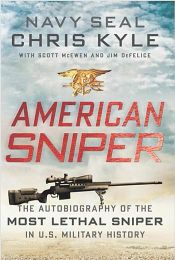"American Sniper" is about one man's evolution from restless civilian to dedicated killer.
"On the front of my arm, I had a crusader cross inked in, I wanted everyone to know I was a Christian. I hated the damned savages I'd been fighting. I always will"
The author seems to be clueless on why he is murdering all these people other then the government told him to do it.

"American Sniper: The Autobiography of the Most Lethal Sniper in U.S. Military History"
By Tony Perry, Los Angeles Times
March 5, 2012
This is the season of celebrity for the Navy SEALs.
The takedown of Osama bin Laden at his hideout in Pakistan thrust the institutionally secretive SEALs into the modern-media spotlight. Soon the SEALs seemed to become America's favorite warriors: silent, deadly, mysterious.
There have been innumerable news stories about SEAL Team Six, which killed Bin Laden. Also, a Newsweek cover story ("Navy SEALs: Obama's Secret Army") and a new movie,"Act of Valor,"featuring real SEALs.
Add to this mix "American Sniper: The Autobiography of the Most Lethal Sniper in U.S. Military History" by former SEAL Chris Kyle, with help from San Diego lawyer Scott McEwen and writer Jim DeFelice, whose credits include a biography of Gen. Omar Bradley and a series of military thrillers.
Kyle is a Texas country boy who found a home in the SEALs and developed a talent, and a liking, for the dangers of warfare and finding the right spot from which to kill an enemy with a single shot. Sniping is a skill that requires patience, nerve and a certain cold-bloodedness, all of which Kyle displayed relentlessly in the major battles of Iraq.
"After the first kill," Kyle writes, "the others come easy. I don't have to psych myself up, or do something special mentally — I look through the scope, get my target in the cross hairs, and kill my enemy, before he kills one of my people."
"American Sniper" is about one man's evolution from restless civilian to dedicated killer. For those who like their American military personnel to be diffident and dutifully respectful of their enemies, this book is not for them.
Kyle is unpossessed by political correctness. He has a seething contempt for the enemy, disdain for Iraqi security forces who are supposed to be U.S. allies, and hardly any feeling at all for Iraqi civilians. Between deployments, he got a tattoo to express his anger. "On the front of my arm, I had a crusader cross inked in," he writes. "I wanted everyone to know I was a Christian. I had it put in red, for blood. I hated the damned savages I'd been fighting. I always will. They've taken so much from me."
By his own admission, he has no interest in either the geopolitics or the high-level strategizing of the Iraq war. While other military personnel, and several journalists, have praised the Sunni sheiks for coming to the side of the U.S. in Ramadi, Kyle has a different view about what turned the tide: "Force moved that battle. We killed the bad guys and brought the leaders to the peace table. That is how the world works."
Kyle's view is blunt and simplistic. While its accuracy may be debated, his view represented the position of the ground soldiers who did the fighting — Army, Marine and SEAL. Kyle's voice deserves attention not as a historic analysis but as the sound of anger from the battlefield and the difficulty of resuming anything that passes for a normal life.
The voice of Kyle's wife, Tara, also deserves attention. Several passages of her comments are interspersed with her husband's story of war and killing. The passages are spare but revealing. In one of these, she finds the idea that her husband is restrained by official rules-of-engagement against an enemy who isn't to be "more than ridiculous, it's despicable." Later, estrangement sets in: "Little by little, I realized I wasn't the most important thing in his life. The words were there, but he didn't mean it."
And still later, she confides: "When our marriage reached a crisis, I said I wouldn't love him the same if he reenlisted again…In the beginning, I believed he loved me more than anything. Slowly the SEAL Teams started to become his first love."
It may not be what Kyle and his co-authors intended, but the story of strife between husband and wife is what gives "American Sniper" much of its wallop: the truism that even when the shooting stops, the impact of the war on those who fought it, and those who love them, has only begun.
tony.perry@latimes.com